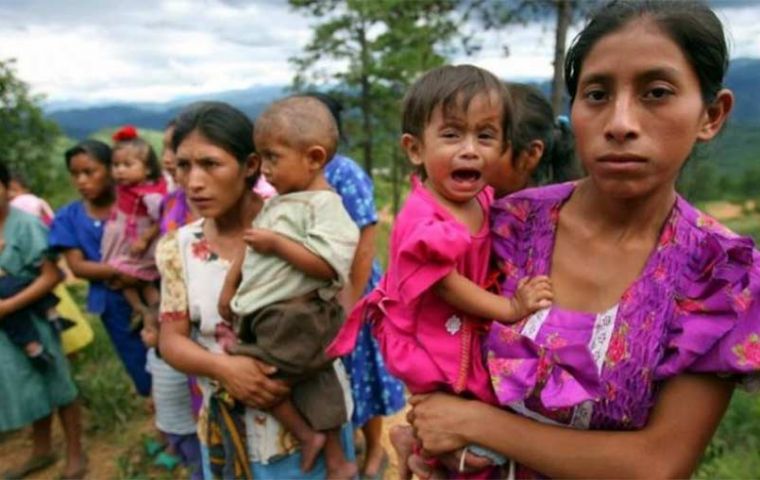MercoPress. South Atlantic News Agency
Evidence found against 40 people for illegal mining in Roraima in 2023
 There are still “structural challenges” in the Yanomami Indigenous Land, such as cases of malnutrition and malaria
There are still “structural challenges” in the Yanomami Indigenous Land, such as cases of malnutrition and malaria Brazil's Federal Police (PF) found evidence against 40 people for illegal mining in Roraima in 2023, Agência Brasil reported citing data obtained through the Access to Information Law (LAI). The PF is due to forward the investigation to the Public Prosecutor's Office, which may or may not file a case before the courts, it was explained.
Illegal mining carries a penalty of six months to one year in prison and a fine, while a crime against property, in the form of usurpation, by exploiting raw materials from the Union, may result in detention for one to five years and a fine, Agência Brasil also noted.
The state of Roraima is home to eight indigenous peoples, according to the Socio-Environmental Institute (ISA). They are the Ingarikó, Macuxi, Patamona, Taurepang, Wapichana, Waiwai, Yanomami, and Ye'kwana. The first five live in the Raposa Serra do Sol Indigenous Land (TI), which became known for the victory of the indigenous people regarding demarcation, after a decision by the Federal Supreme Court in 2009. The Yanomami and part of the Ye'kwana live in the Yanomami Indigenous Territory.
Brazil's federal government declared a Public Health Emergency of National Importance due to the humanitarian crisis in the Yanomami territory in Roraima on Jan. 20, followed by a series of operations to assist the Yanomami population and force the removal of non-indigenous people from the site. Ethnic leaders are now calling for the resumption of federal government operations aimed at ensuring health care and greater security in the region.
To evaluate the federal government's actions over the past six months in combating illegal mining, the Hutukara Yanomami Association (HAY), the Wanasseduume Ye'kwana Association (SEDUUME), and the Urihi Yanomami Association launched this month, in partnership with ISA, the report We Are Still Suffering, which shows that some measures have yielded results, but part of the miners have returned to Yanomami territory by river.
The invaders were reported to have remained in points such as Papiu, Parafuri, Xitei, and Homoxi, close to the villages and arriving “on regular helicopter flights”. In June, the PF announced the 33-day milestone with no illegal mining alerts in the Yanomami Indigenous Territory (TIY).
“Unfortunately, however, the absence of new alerts does not mean the complete neutralization of mining. First, because the rainy season, which begins at the end of April and peaks in June, can make it very difficult to verify changes in the forest by remote sensing, due to the intense cloud cover in certain areas, and second, because some mines may be active in areas that had already been deforested, which is the most likely scenario at the current juncture,” the indigenous peoples denounced in the report.
The Ye'kwana and Yanomami leaders also cite in the document the evolution of mining into narco-mining, a situation that changes with the penetration of criminal factions into indigenous territories. As it grows and expands into new areas, illegal mining resorts to heavily armed militias associated with criminal factions in order to impose itself and guarantee territorial control. As a result, the Yanomami and Ye'kwana are prevented from moving freely through the indigenous land at the risk of being murdered. In this context, death threats and humiliation are frequent.
“Once an armed conflict between communities is established, the situation can last for years, generating a vicious cycle that, in addition to human losses, produces a scenario of permanent insecurity, as observed in Parafuri. People are afraid to go out hunting, to cultivate more distant gardens, and to move along the river, which also has a profound impact on the families' productive system,” they wrote.
The National Foundation for Indigenous Peoples (FUNAI) and the Ministry of Indigenous Peoples said in a statement that the dignity of the indigenous peoples is one of the priorities of the federal government but there are still “structural challenges” in the Yanomami Indigenous Land, such as cases of malnutrition and malaria.
The agencies also cite 119 arrests of people involved in illegal mining in Yanomami territory since February, 91 of them since June 21. According to the government, 95% of the miners have left the territory. The ministry and the foundation also highlight the performance of more than 30,000 health services, the delivery of more than 3 million medicines and supplies, and the supply of 12,000 kilos of food through the Food Acquisition Program (PAA). (Source: Agência Brasil)




Top Comments
Disclaimer & comment rules-

Read all commentsTWIMC...
Aug 12th, 2023 - 07:56 am 0- The ignorance..., incompetence and laziness of certain “Independent News Agencies” identifiyng themselves as “Latinoamerican”..., is just flabbergasting...!!!
The above article's picture is a perfect example of it...:
An article about the South-American Yanomami Indigenous Peoples plights...?
- NO PROBLEMO..., they just splash any picture of some sad looking Central-American brownish peasant women bearing crying babies...
Who cares anyway...? Not their Brainwashed Anglo Turnip reader base..., that's for sure...
Hereby..., yust for your kind info a picture and some info about the Yanomami..., taken &written by NON TURNIPS...:
https://www.iwgia.org/en/news/5219-yanomami-history-returns-as-a-tragedy-foretold.html
Capisce...?
Commenting for this story is now closed.
If you have a Facebook account, become a fan and comment on our Facebook Page!